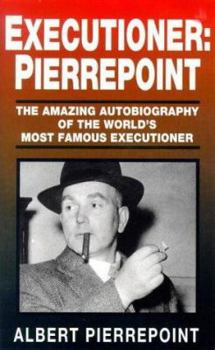Executioner, Pierrepoint
Select Format
Select Condition 
Book Overview
No Synopsis Available.
Format:Paperback
Language:English
ISBN:0340717017
ISBN13:9780340717011
Release Date:January 1998
Publisher:Coronet Books (GB)
Length:208 Pages
Weight:0.30 lbs.
Customer Reviews
2 ratings
An amazing craftsman
Published by Thriftbooks.com User , 17 years ago
A truthful, direct, plain-spoken autobiography. Albert had been born into the business - both his father and his uncle had the job, if you can call it that. At the start of the 20th century the job was done by part-timers & freelancers who had other day jobs or small businesses. A hangman might get a couple of hangings a month, traveling to various prisons across UK to kill condemned prisoners. For Albert, growing up poor in rural Yorkshire, the job offered an apportunity to travel, plus he really wanted to follow in his father's footsteps. Albert never thought much about moral/ethical/humanistic issues - he let the judges and the juries think about those weighty matters. Instead he threw himself into becoming the best craftsman he could be. Since hangings were customarily performed at 8 am, he perfected his technique to such an extent that entering a condemned prisoner's cell as the prison clock struck for the first time, he'd have a body dangling from a perfectly still rope by the time the clock struck for the 8th time. In the end Albert came to believe that capital punishment was no deterrent but only satisfied society's need for revenge. A gripping read to the last drop.
Fascinating history of a fascinating man.
Published by Thriftbooks.com User , 18 years ago
What does it take to be an executioner? What kind of man must one be in order to push the lever and "drop" a man or woman into the hereafter? After thoroughly reading through this book three times, I still cannot answer that question. I have privately wondered if I had been born in similar or identicle circumstances during the same era, could I have performed the job. In all honest, I cannot answer that question either, despite my hardcore opposition to capital punishment. "Executioner, Pierrepoint" is the life story of Britain's last Chief Executioner, written by Pierrepoint himself and revealing, perhaps for the first time, the secrets of the gallows in Great Britain. Whether you are good, bad or indifferent on the issue of capital punishment, "Executioner, Pierrepoint" is a very good read, if you can get past Mr. Pierrpoints very "British" style of writing. The slang terms, and phrases that he uses struck me as being very common to what one would expect to hear in Great Britain during the first half of the twentieth century. I could almost hear in my mind his accent coming off the pages. His autobiography was well written and he did a good job of leading me through his life story beginning as a child in World War I, the turbulence of World War II, the changes in public perception about capital punishment in Britain during the 1950's, and ending with his retirement in the late 1950's all without boring me in the slightest. In fact I found it difficult to put the book down. I would definitly recommend this book to anyone who enjoys reading about history or penology. I believe that you will find it as informative as I did.






